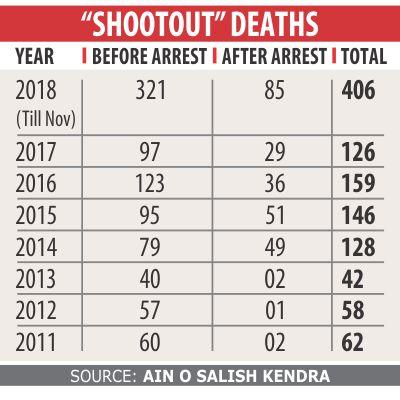Ziaur Rahman left his Cox's Bazar home in September and went on a religious tour fearing he would be arrested or killed during the anti-narcotics drive of law enforcers.
He was lodging at a mosque in Gopalganj district during his tour on November 21 when plainclothes men picked him up, according to his family. Zia's body was found in his district's Teknaf upazila four days later.
Police claimed that Ziaur was a notorious drug dealer and was killed in a shootout with police.
Like Zia, a record 406 people were killed in so-called shootouts between January and November 30 this year, according to rights body Ain o Salish Kendra.
It said at least 261 of the deceased were allegedly drug dealers and they had been killed in so-called shootouts with law enforcers since the crackdown on drugs on May 4.
The number of deaths in shootouts is over three times that of last year's 126.
The second highest number (354) was recorded in 2005 and the number had stayed below 200 every year since 2007, according to ASK.
ASK Executive Director Sheepa Hafiza told The Daily Star that the increased number of deaths without trials was shameful for a state.
“The killings should be properly investigated and tried as the state has no right to kill people indiscriminately in the name of drive against drugs,” she said.
It is a gross violation of human rights and these extra-judicial killings have tainted all the good deeds done by the government, she added.
Rights activists said the overall human rights situation in the country deteriorated this year with incidents of shootouts, enforced disappearances, and violence against women and children persisting throughout the year.
They also criticised the role of the National Human Rights Commission for what they said was it being subdued.
Amid such a situation, the nation is observing International Human Rights Day today.
The day means nothing to Nazma Begum, wife of Anisur Rahman, a victim of a so-called shootout.
He was killed on May 29, a day after allegedly local police picked him up from his Satkhira house.
“This day means nothing to a family like us. We even do not dare to seek justice for the killing of my husband who was taken away by police in front of my eyes,” Nazma said.
Former National Human Rights Commission chairman Prof Mizanur Rahman denounced the extra-judicial killings.
“It is not that the law enforcers are getting involved in such shootout incidents for the sake of state security … we have examples in which they did it for revenge or personal interest.
“The voice and protest by the human rights commission of a country, whether it has executive power or not, work as warnings, decreasing the number of such incidents,” he said.
The professor also said the commission raising its voice was itself a barrier to such heinous act. “But unfortunately, strong voice by the commission is not heard.”
Between 2004 and 2018, the number of such deaths was the lowest in 2013, when 42 people were killed, amid years of protest and demand for ending such extrajudicial killings.
Incumbent NHRC Chairman Kazi Reazul Hoque said, “The country's overall human rights situation improved this year.”
But some incidents of human rights violations, including killings in “crossfire” during anti-narcotics drive had occurred, he said, adding that no one should be killed without trial.
Asked about allegations of the commission's inaction, Reazul said, “The allegations were made with ulterior motives. We lodged our protest and raised our voices wherever any incident of human rights violation took place. We have sent to the government a list of recommendations on how to preserve human rights.”
